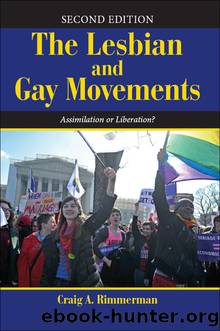The Lesbian and Gay Movements by Craig A Rimmerman

Author:Craig A Rimmerman [Rimmerman, Craig A.]
Language: eng
Format: epub
ISBN: 9780813348506
Publisher: Westview Press
The Implications of the Marriage Debate for the Lesbian and Gay Movements
As we have already seen, the campaign for same-sex marriage has been rooted in litigation, and it has now garnered the support of most major national lesbian and gay organizations, including the Lambda Legal Defense and Education Fund, the National Gay and Lesbian Task Force, and the Human Rights Campaign. Its status as one of the leading issues of the late 1990s and early twenty-first century is evidenced by the contention of Lambdaâs Evan Wolfson that, in the wake of the Hawaii Supreme Courtâs Baehr decision, there should be no âintra-community debate over whether to seek marriage. The ship has sailedâ (Warner 1999, 83). For strategic reasons, Wolfson believes that the lesbian and gay movements should present a united front in support of same-sex marriage if homophobic Christian Right initiatives are to be defeated.
The results of the 2004 electionâwhich saw the re-election of George W. Bush, the election of a more conservative Congress, the passage of eleven state ballot initiatives banning same-sex marriage, and election-day polls indicating that 22 percent of voters focused more on âmoral valuesâ than on other factors (Keen 2004, 20)âdid not bode well for those supporting same-sex marriage and lesbian, gay, bisexual, and transgender issues more broadly. In the wake of the election, movement leaders held discussions about future strategy and whether more moderate goals and strategies should be pursued in light of the grim election results. The Human Rights Campaign, the countryâs largest lesbian and gay advocacy group, accepted the resignation of Cheryl Jacques as its executive director, appointed the first nongay cochair to its board, and publicly announced a more moderate political and electoral strategy, one that would focus less on âlegalizing same-sex marriages and more on strengthening personal relationshipsâ (Broder 2004, A1).
But the reality is that same-sex marriage is now a part of the national political debate about lesbian, gay, bisexual, and transgender rights for the foreseeable future. Indeed, scholar Michael Klarman believes that ânot all of Bowersâs consequences for the gay rights movement were adverse. The Courtâs decision made gay rights issues highly salientâ (2013, 38), even though âthe gay rights community was devastated by Bowersâ to the point that Tom Stoddard of Lambda Legal Defense and Education Fund cited the Bowers decision as âthe gay communityâs Dred Scottâ (37). We are seeing the consequences of the Bowers decision in the amount of attention being devoted to same-sex marriage. And the movements have recognized over time that they must fashion a political and educational organizing strategy that recognizes and accepts this reality. It is a reality that has played to the strength of the Christian Rightâs grassroots organizing efforts over time, because same-sex marriage is the kind of hot-button social issue that can mobilize voters to support conservative candidates and conservative ballot initiatives, as the 2004 and 2006 election results indicate. âThe efforts to build a diverse coalitionâin terms of race and religionâunderscore the political sophistication of the religious activists who oppose gay marriage.
Download
This site does not store any files on its server. We only index and link to content provided by other sites. Please contact the content providers to delete copyright contents if any and email us, we'll remove relevant links or contents immediately.
| Anthropology | Archaeology |
| Philosophy | Politics & Government |
| Social Sciences | Sociology |
| Women's Studies |
Cecilia; Or, Memoirs of an Heiress — Volume 1 by Fanny Burney(32558)
The Great Music City by Andrea Baker(32020)
Cecilia; Or, Memoirs of an Heiress — Volume 2 by Fanny Burney(31956)
Cecilia; Or, Memoirs of an Heiress — Volume 3 by Fanny Burney(31942)
We're Going to Need More Wine by Gabrielle Union(19049)
All the Missing Girls by Megan Miranda(16032)
Pimp by Iceberg Slim(14509)
For the Love of Europe by Rick Steves(14124)
Bombshells: Glamour Girls of a Lifetime by Sullivan Steve(14077)
Talking to Strangers by Malcolm Gladwell(13371)
Norse Mythology by Gaiman Neil(13370)
Fifty Shades Freed by E L James(13243)
Mindhunter: Inside the FBI's Elite Serial Crime Unit by John E. Douglas & Mark Olshaker(9344)
Crazy Rich Asians by Kevin Kwan(9293)
The Lost Art of Listening by Michael P. Nichols(7506)
Enlightenment Now: The Case for Reason, Science, Humanism, and Progress by Steven Pinker(7314)
The Four Agreements by Don Miguel Ruiz(6765)
Bad Blood by John Carreyrou(6623)
Weapons of Math Destruction by Cathy O'Neil(6281)
